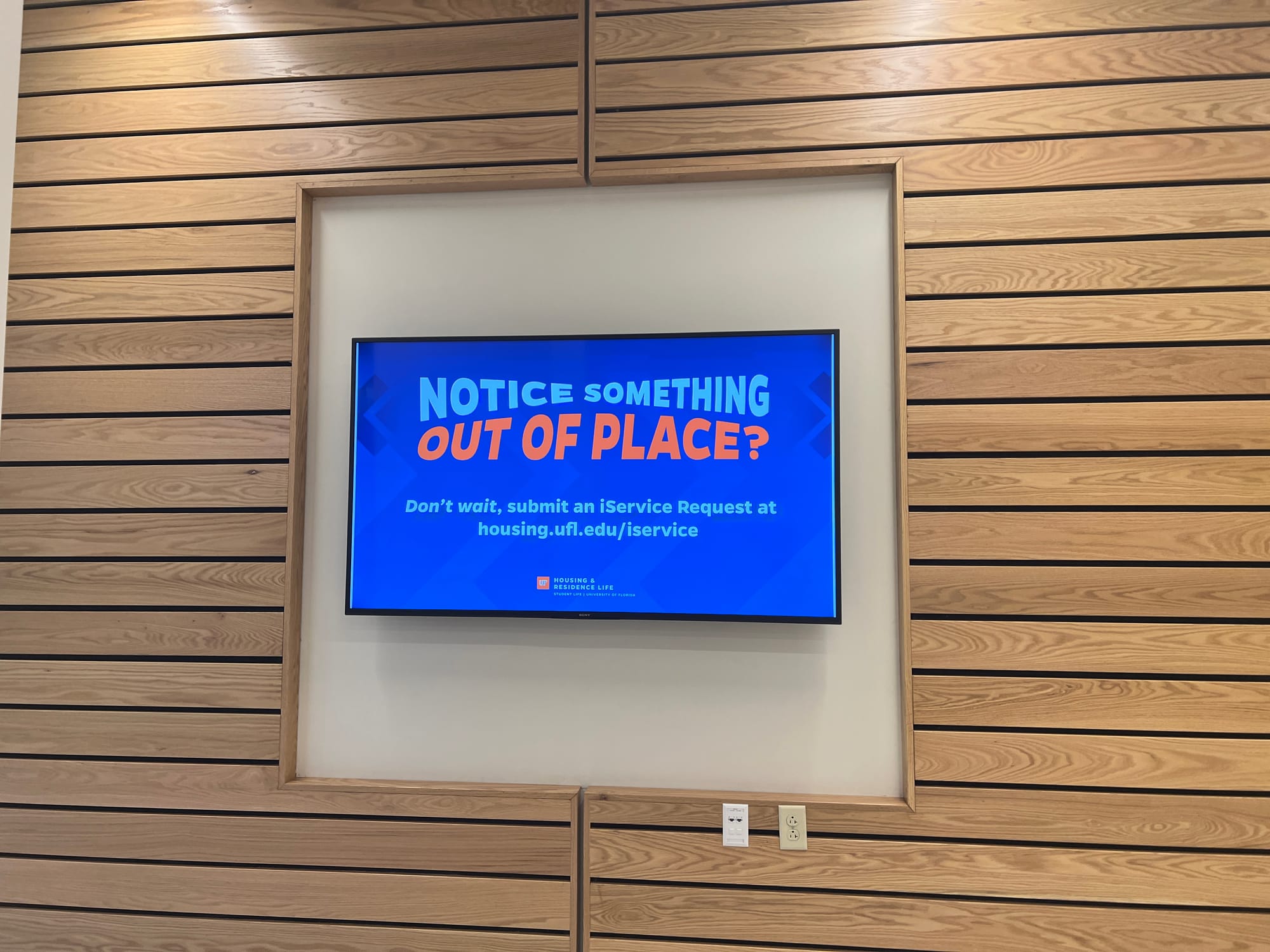University of Florida

Ranked among U.S. News’ five best public universities in the United States, the University of Florida (UF) in Gainesville has been driving innovation and pushing boundaries since 1853. As the diverse and academically rich school evolves, technology plays a key role in enhancing visualization, promoting critical information, and facilitating collaboration, while helping to set a standard of excellence.
Among those technologies are Sony’s professional BRAVIA displays. Favored for their combination of superior image quality, easy 24/7 operation, extensive control and integration options, and system on a chip (SoC) platform, these displays are used by leading corporations, retailers, and schools like UF.
Over the last year, UF implemented upwards of 200 of Sony’s BZ30 and BZ40 series of professional BRAVIA displays, ranging in size from 32- to 100-inches, in its public spaces. Currently under construction is the school’s Honors Village, a premium housing facility serving honors residents. 116 Sony 55- to 85-inch displays are a part of this new build, and can be found in dorm rooms, common areas, and meeting rooms. An additional 18 Sony displays are used for signage in and around the Student Health Care Center, in hallways, and at egress points, where they communicate relevant information. The Traffic Signal Lab, which specializes in signal control testing, features 14 of Sony’s displays. The veterinary surgery teaching lab incorporates 18 32-inch displays which are used at the end of the tables, while the veterinary anatomy lab is standardized on 11 55-inch and five 65-inch models. In the Dean of Students area, 14 55-inch displays are used for digital signage. Additional Sony displays are featured in conference rooms and digital signage setups throughout the university.

Lon Vance, Sr. Engineer and Project Manager of Audio Visual Systems for the University of Florida’s Audio Visual Systems and Academic Technology helped lead these installations to augment UF’s display capabilities. With a background in high-end home integration, he’s spent his career selecting and implementing the latest technologies and is no stranger to the Sony brand.
The combination of beneficial features, control options, and strong warranty policies that Sony’s professional displays provide helped steer Vance in their direction. In particular, he appreciates the displays’ processing power and true-to-life colors. Vance noted, “One of the main drivers to use a Sony display is the image processing, which is superior to any other display in the market right now and makes everything look better. With Sony, the reds look like a red, and the details are prominent which is important to our areas that support the arts and architecture. Our pro BRAVIA displays provide a better image and better picture than other displays we’ve used, plus they’re easier to control.”
He added, “Additionally, the system on a chip, which we use for digital signage, is excellent and saves you the price of a PC. We use NoviSign digital signage software which can be put right on the display. It’s easy – because the display is Android-based, you just download the app and you’re good to go.” Of the warranties, Vance stated, “We have three- and five-year warranties on our displays and advanced replacement, which is great.”
Sony’s professional BRAVIA displays also work to address the need for displays in high-ambient and direct-light environments. For Vance, they are an ideal solution for UF’s digital signage needs and use in brightly lit hallways. Architecture featuring natural light is often favored by buildings looking for LEED certifications, which is where these displays shine. Vance has the pro BRAVIAs in spaces that filter in direct sunlight and there are no issues with glare.
On the topic of sustainability, it is increasingly important to customers and integrators, and Vance acknowledges Sony’s mindful sourcing of materials and manufacturing, as LEED ratings help drive standards and policies, and impact decision-making.
Critical to any large university is security and Sony’s BRAVIA displays help UF handle this concern with ease due to their RS-232 capabilities. Vance explained, “We’re on a layer 3 corporate network and have a network security team that doesn’t want anything on the network that doesn’t have to be. We have a whole VLAN dedicated just to digital signage, so when we plug a display in for digital signage, it’s more secure and can’t be accessed by students. Our control systems are on another subnet so RS-232 control is big.”
Vance is tasked with designing, installing, commissioning, and programming all of the school’s technology in-house so saving time and money is always top of mind. Another benefit Sony’s displays offer to an installation like Honors Village is the ability to easily duplicate settings across their stable of displays. Vance said, “When we’re doing the housing project, we set up one display with all our preferred settings, which we put on a USB drive that we plug into each display, and ‘boom’ it’s all set. You don’t have to sit there and go through a menu 50 times. You simply go into Pro Mode, tell it to import the settings and you’re done. You could easily spend 15 or 20 minutes going through a display and optimizing the settings, so to save 15 or 20 minutes on 116 displays – that’s a lot of time.”
Vance also favors the total cost of ownership associated with Sony’s displays, which he finds more favorably priced when compared to alternative solutions. Competitive prices paired with higher-quality images and processing yield a perfect combination for UF.
Next up, UF is working on a residential gaming lounge. Sony’s professional displays, which incorporate high hertz for a powerful refresh rate, and the detail and immersion of 4K, will bring students a next-level experience and a much-needed place to unwind.
University of Florida case study link: https://pro.sony/ue_US/press/university-florida-pro-bravia-case-study
